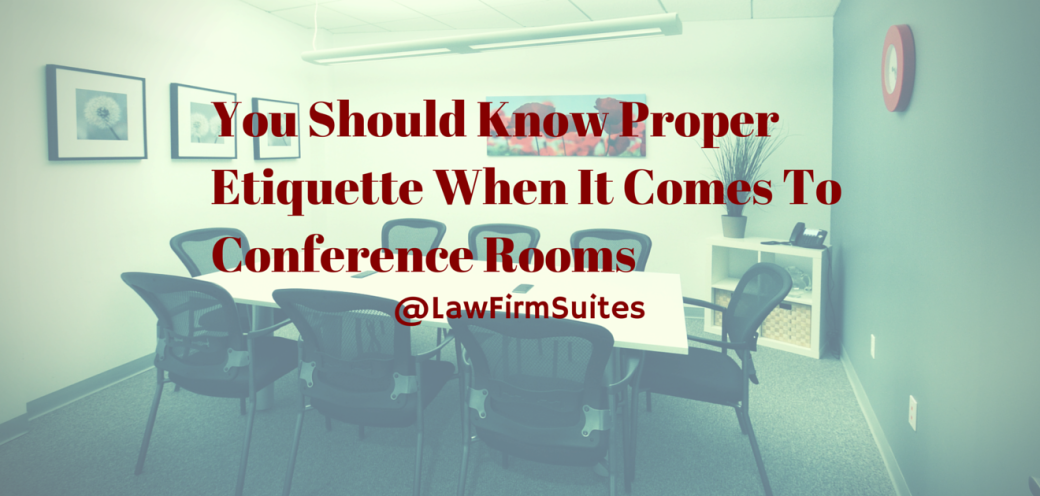Having great conference rooms is a key feature in terms of shared office space. Proper etiquette is something you should practice with your suitemates.
Conference rooms. Not only are they a good resource for attorneys, but they are also an important part of an attorney’s path to success.
A lot of an attorney’s time is spent sitting across a table and conducting meetings, whether it be a consultation, deposition, or closing.
When using conference rooms, it is extremely important to demonstrate the best etiquette, especially in a shared space. If you don’t you may be depleting your chances of referral potential indefinitely.
While good behavior might be obvious, for many it is something that falters. At Law Firm Suites, there are both “written” and “unwritten” rules for conference room etiquette. Following these rules will keep you in the esteem of your colleagues and negate from any negativity.
1. Never leave the conference room filthy.
A conference room in a shared space should feel like your second home. You wouldn’t leave your home filthy with others around? Right?
It is never fair to have someone clean up your mess and this can be remedied even if you don’t feel there is enough time. Onsite staff it there for many reasons and their help can be enlisted even if there is a time crunch for cleaning.
2. Always schedule conference rooms to accommodate your meetings.
Your conference room meeting could be very important and having someone walk in on an important meeting is both embarrassing and damaging to the interaction.
Having a room booked to accommodate potential overages is an essential solution to having someone mistakenly walk in to your important meeting making for an awkward situation.
3. Never just jump into an empty conference room.
Conference room booking system not only promote orderly booking but fairness in usage. If a conference room is seemingly empty, don’t just pop in like you own the place.
You never know what could happen in the next thirty seconds and you can be met by a slew of clients and the designated attorney confused by your presence.
4. Under no circumstances should you treat the conference room as your second office.
A big table to spread out and do your work is often one of the most desired things to do. If it’s in your own office then by all means do it, but it’s often frowned upon in a shared office space, especially if another attorney needs the space to meet a client. Your own work can be accomplished at your desk and if you do not have adequate space, arrangements can be made in your office space to use an vacant office on a temporary basis.
5. If you happen to double book, just cancel one.
Reservation calendars are important to check and be aware of because it negates from double booking. When one happens to double book, it is important to cancel so that someone else who needs it can use it.
6. Make sure you book a room as early as possible…and cancel early too.
It can be difficult to schedule a meeting with a client. Sometimes they even happen the same day! If a meeting is scheduled, make sure you book the room as soon as possible. If it’s happening days before, don’t wait until the last minute to do so. Otherwise, you could find yourself without a conference room. This is not the fault of the receptionist.
Also, when you have a cancellation, discuss with onsite staff about cancelling.
7. Encroachment on your time doesn’t need to be a reason for a brawl. Get the staff to handle it.
Unless there are no other options, try not to handle a conflict yourself. This may lead to a contentious environment later on which can jeopardize your referral stream in the future. Have a receptionist or the office center manager be the “bad guy.” They can handle it.
8. Accommodate the needs of others in the space.
Remember the Grand Staircase from Titanic? Everyone wants bigger because it looks more appealing.
However, with conference rooms, if you have two clients and a room that can fit fifteen, make sure someone else doesn’t have a need for the room. You making an effort to switch rooms to help them out seems like a tiny gesture, but in the long run can really boost your appeal for being on the receiving end of a referral.


